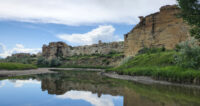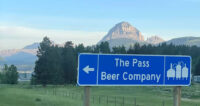Lest we forget those who died for us
By Lethbridge Herald on November 11, 2022.
David Forbes – GUEST OPINION
Hidden away among thousands of dust-free boxes in the seldom seen corners of the National Archives in Ottawa is a small cardboard box containing the military records of Albert Mountain Horse (Reg. No. 30396). I discovered this box while doing research for my Master’s thesis at Carleton University.
His military record states Mountain Horse was born Dec. 25, 1893, and was an Indian from the Blood Reserve who signed an oath of enlistment with the Canadian Army Service Corps on Sept. 13, 1914, at Valcartier, Quebec. He stood 5 ft. 11 inches and had a 35-inch chest. It shows that he previously served with the 23rd Alberta Rangers, and had been a cadet instructor.
Ten months later, on July 31, 1915, Mountain Horse was reported “dangerously ill” with bronchial pneumonia after being gassed three times at Ypres, France. A week later he was diagnosed with pulmonary tuberculosis and transferred to England. Although his condition showed some improvements, Mountain Horse was given a medical discharge on Oct. 29, 1915, and sent home to Canada on Nov. 11, 1915. However, Albert Mountain Horse died on Nov. 19, 1915, in Quebec, and his body sent home by train.
In the Nov. 29, 1915, edition of the Lethbridge Daily Herald appeared a spectacular front-page account of the funeral of Albert Mountain Horse, a 21-year-old Blood Indian, also known as Kukutosi-poota (Flying Star). The article headline read: “White and Red Races Unite in Last Tribute to Brave Indian: Albert Mountain Horse who died of war wounds.”
Hundreds of people filled the streets of Macleod (now Fort Macleod) and an unnamed Herald reporter provided a vivid in-depth account of the funeral in the next day’s paper. The article mentions Mountain Horse’s parents and siblings.
“The mother of the deceased, who was deeply attached to her son, was on the (station) platform some hours before the appointed time for the service to commence. She was attired in full Indian dress and during the waiting hours gave vent to her expressions of grief in a manner which was most pathetic to witness.”
The article lists the dignitaries present, including a contingent of Boy Scouts, members of the Home Guard and Royal North-West Mounted Police, four officiating ministers from the Anglican Church, the Indian Agent, officers of the Blood Reserve cadet corps, the mayor of Macleod and several councilors, the chief of police, five Indian Chiefs – Shot Both Sides, Weasel Fat, Running Wolf, One Spot and Running Antelope – many members of the Blood Tribe, and hundreds of townsfolk. Businesses closed for the occasion.
The reporter commented: “The respect shown was a fitting tribute to this gallant boy who gave his life willingly for his King and Empire, although not called upon to do so.”
As the cortege made its way through the streets of the town, the reporter suggested “the sight was a most inspiring but solemn one, and was a great tribute by the white race to the memory of this young Blood Indian.”
Mountain Horse’s coffin was carried out of the church by his father, three brothers and Jack Bull Shields, while George Frederic Handel’s Death March of Soul was played in the background. At St. Paul’s Anglican cemetery, all four ministers conducted rites; then the young soldier’s comrades from the cadet corps fired their rifles over the coffin and the Last Post was played.
12-11




